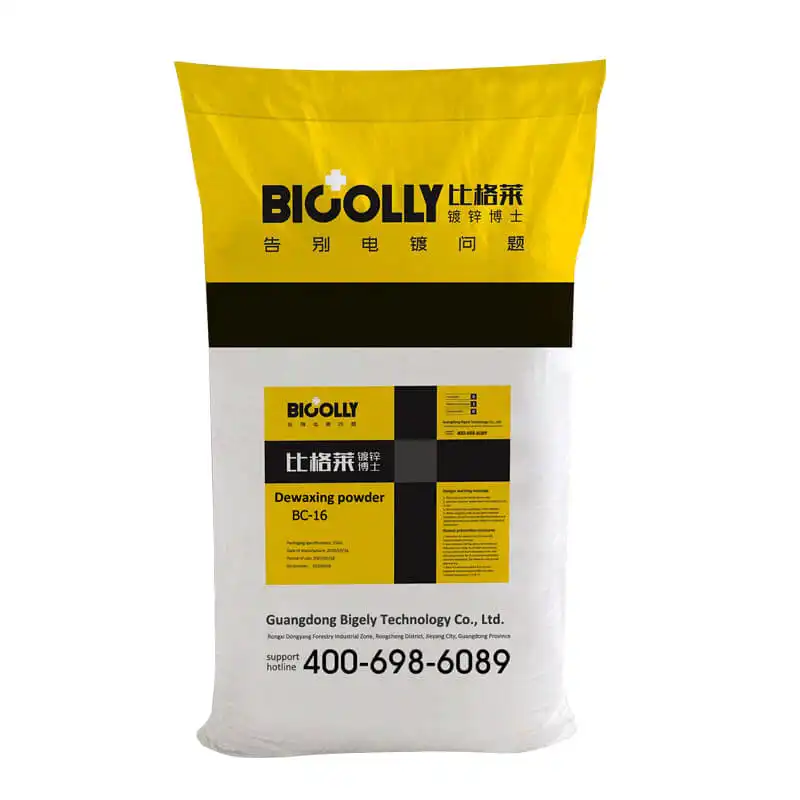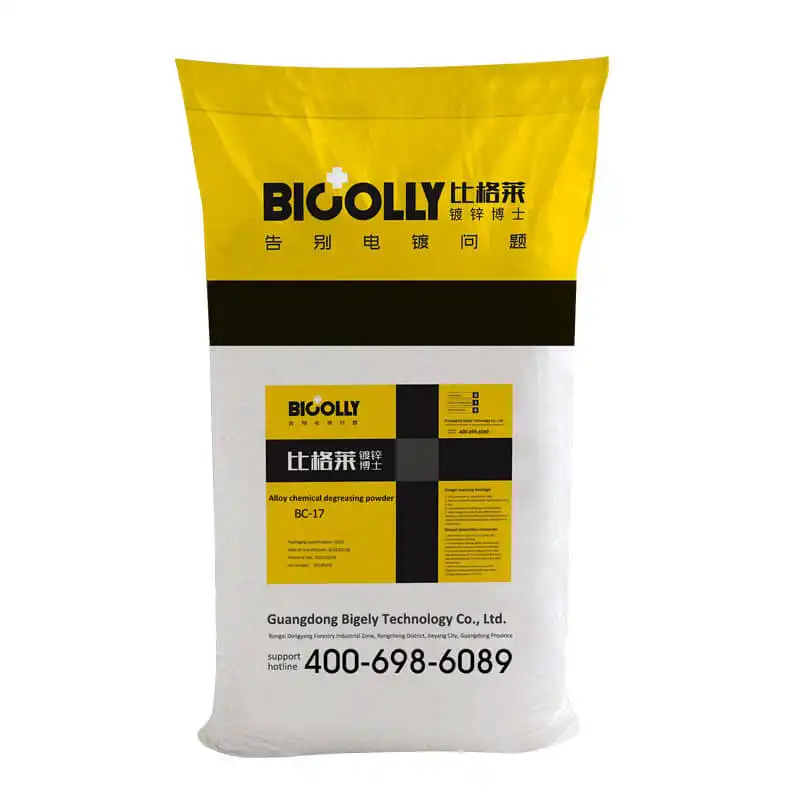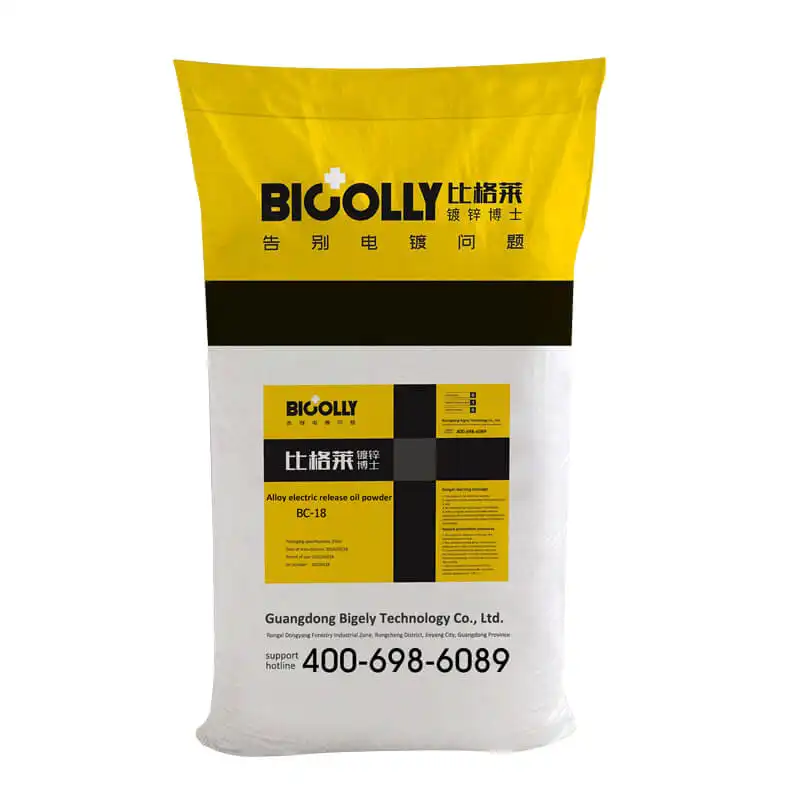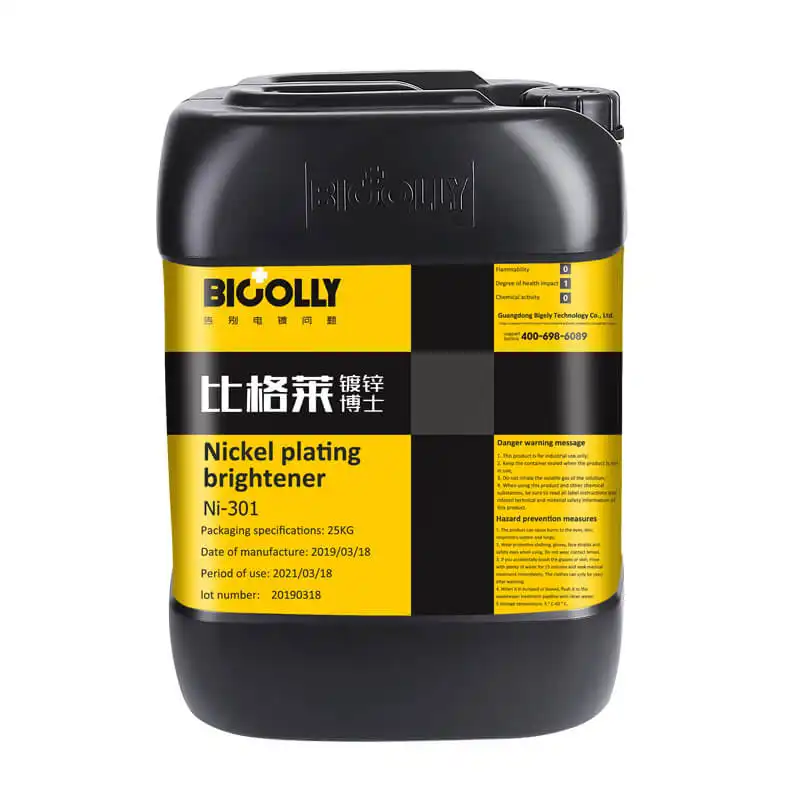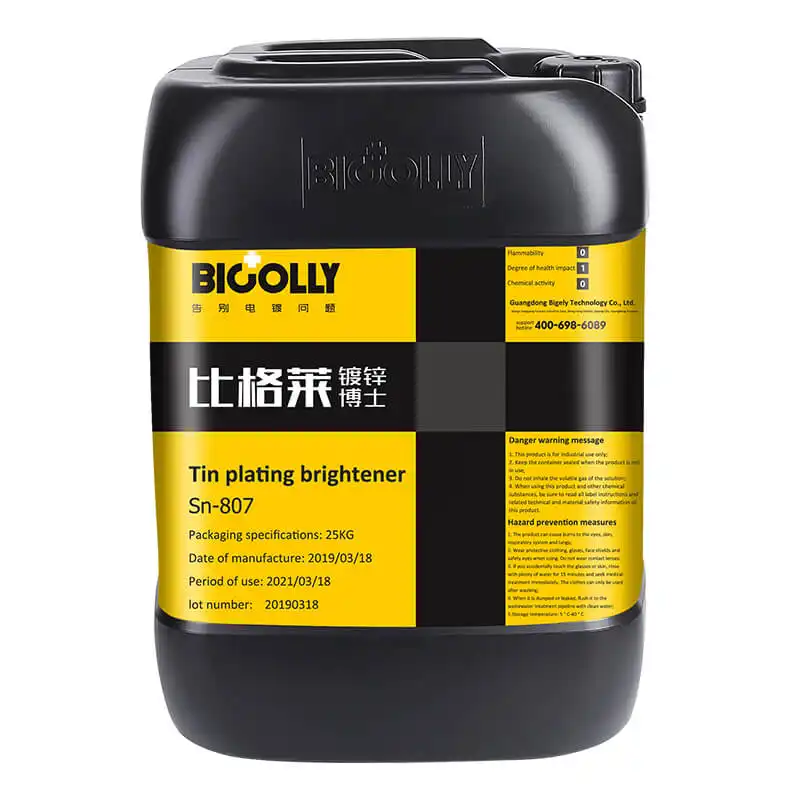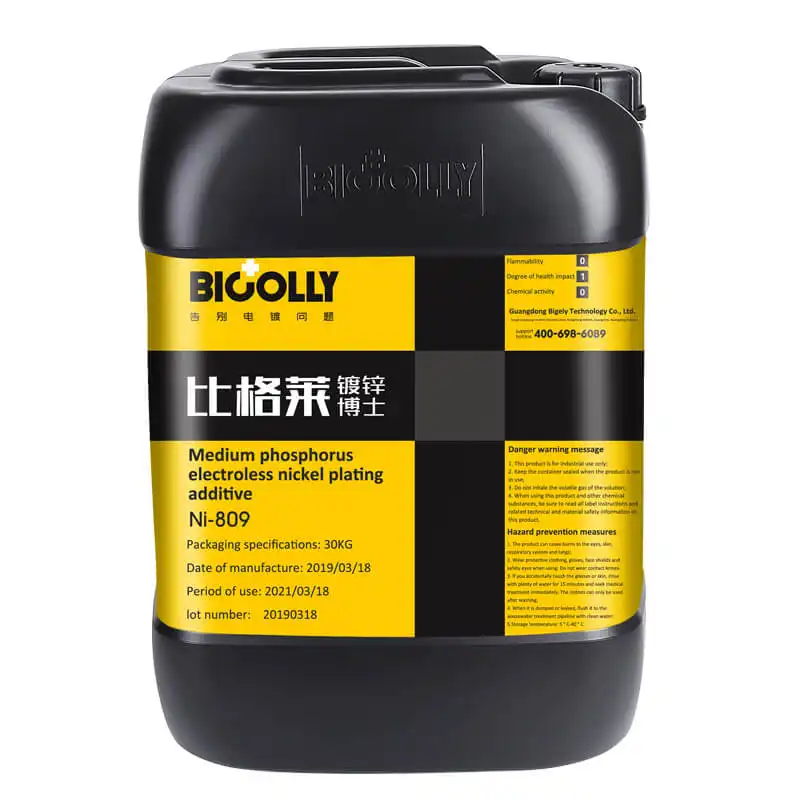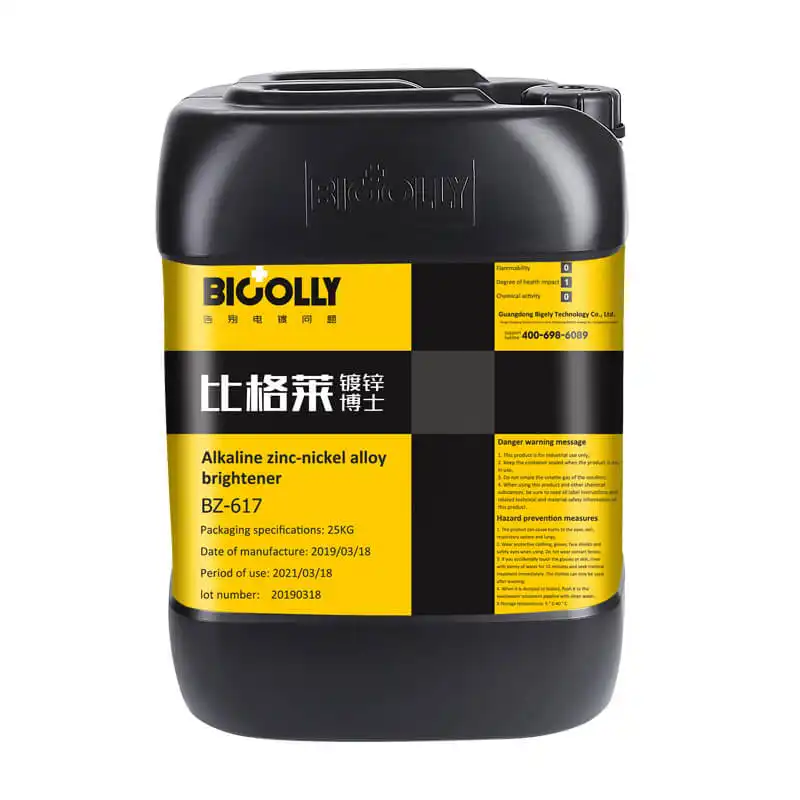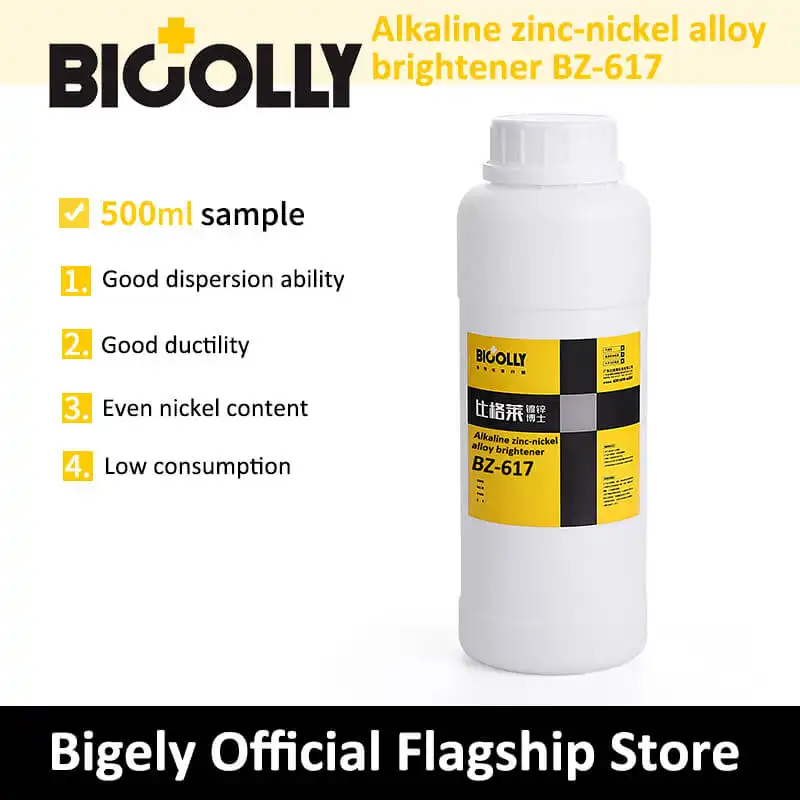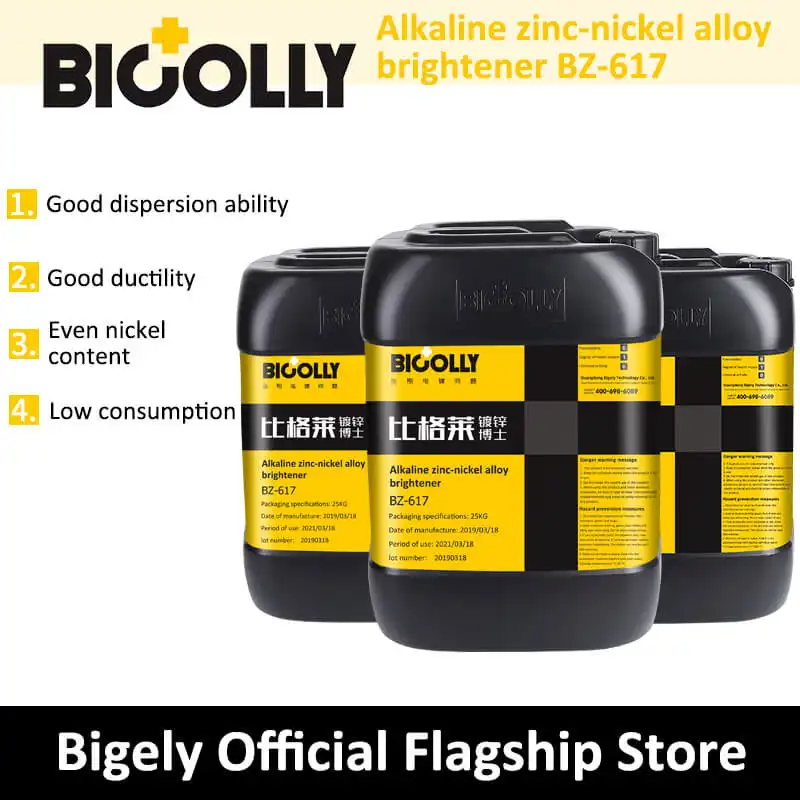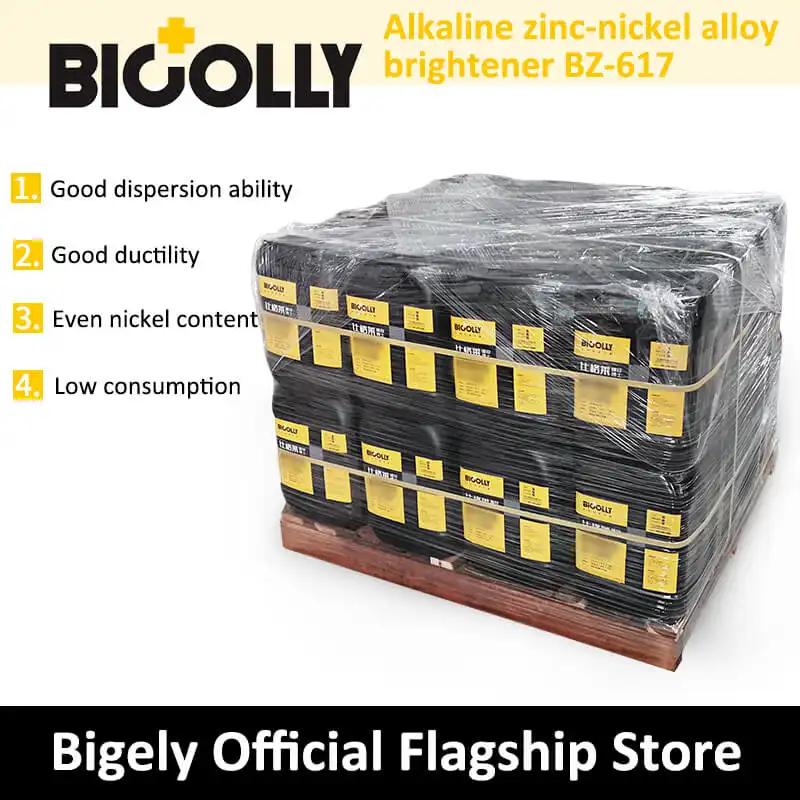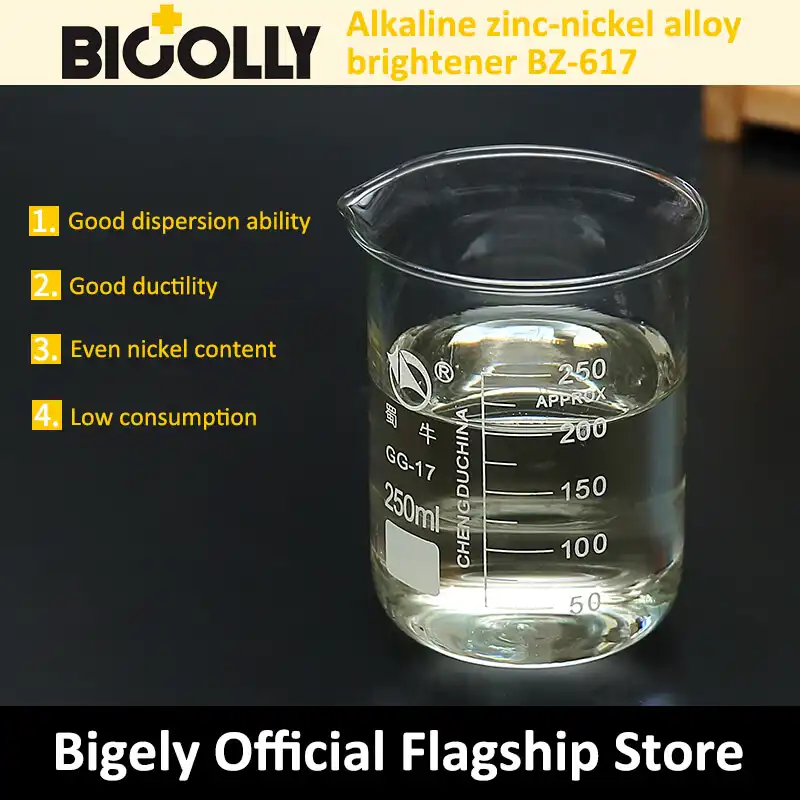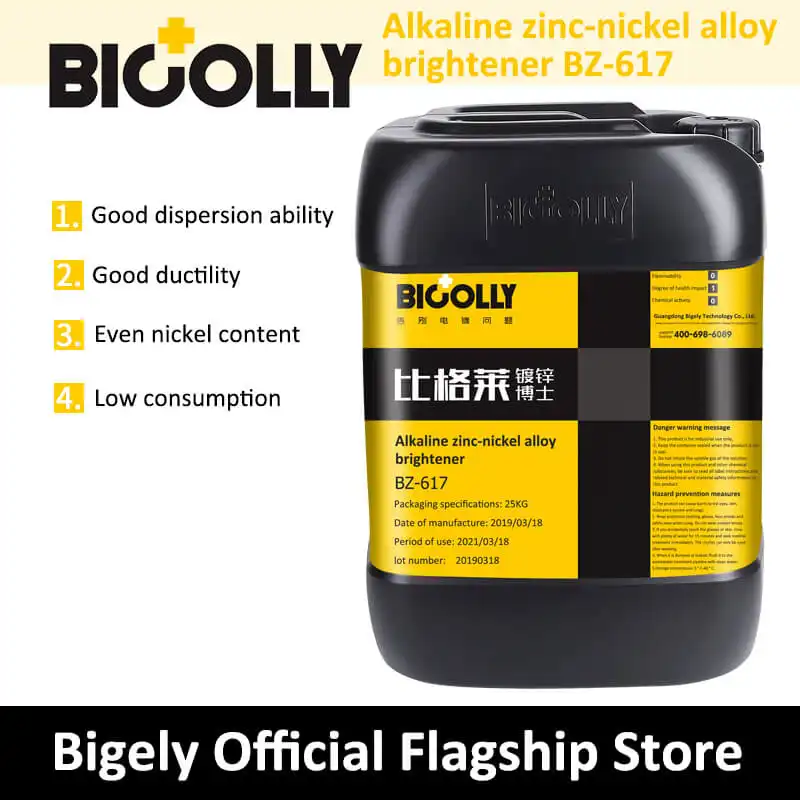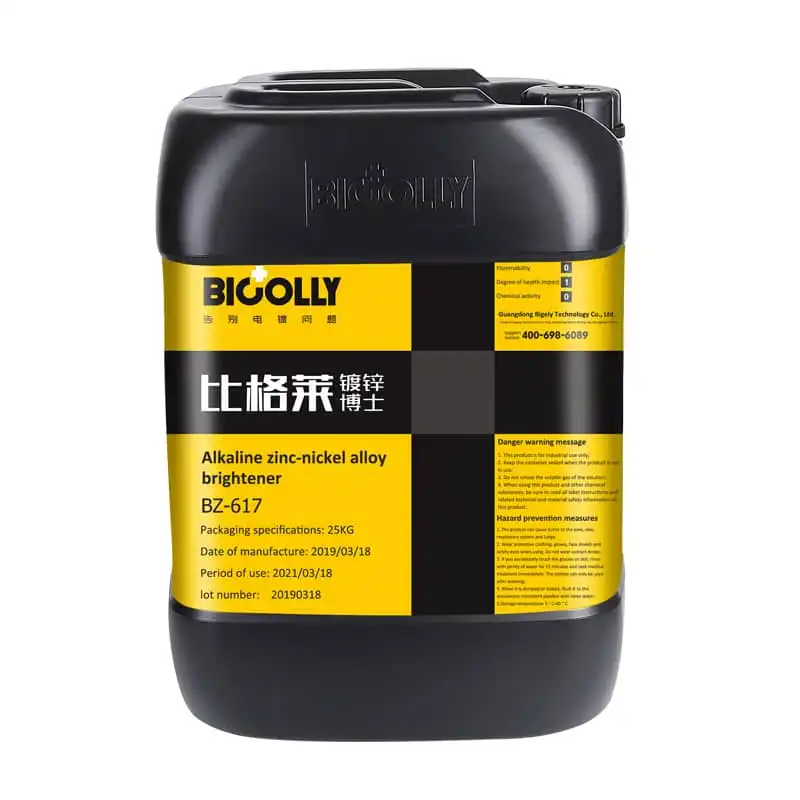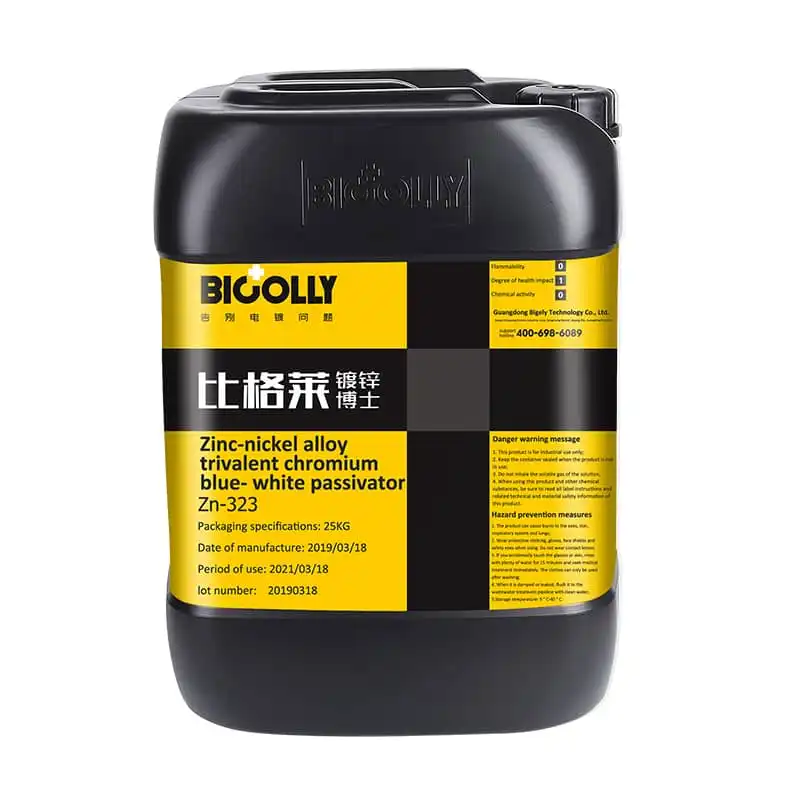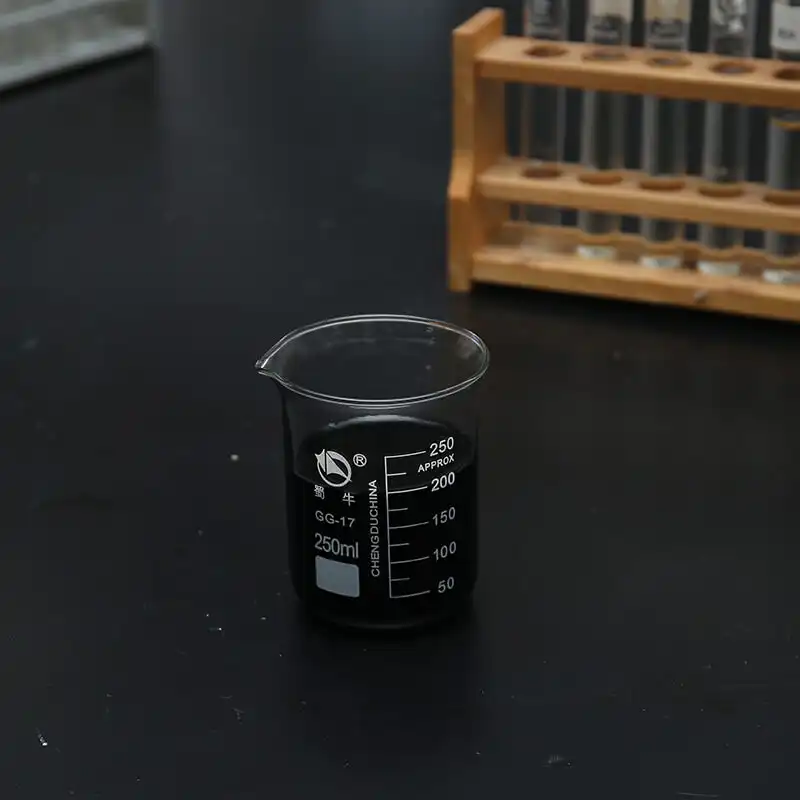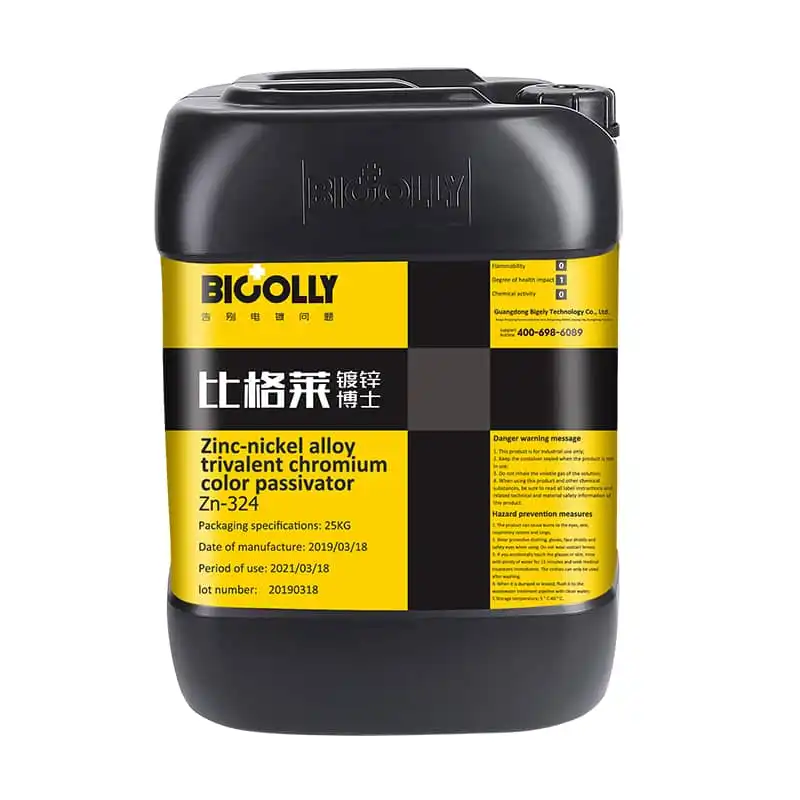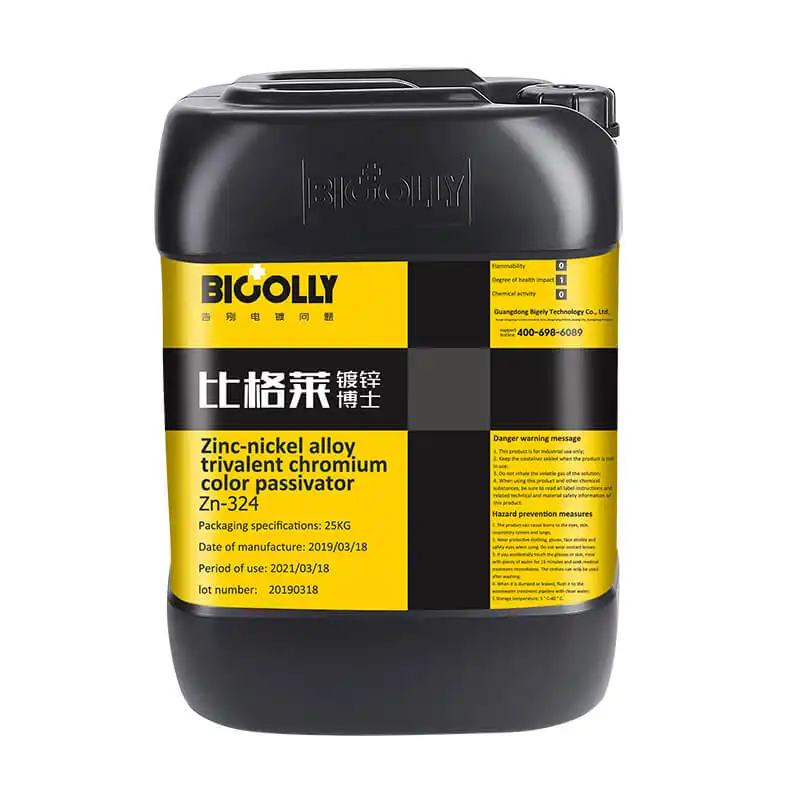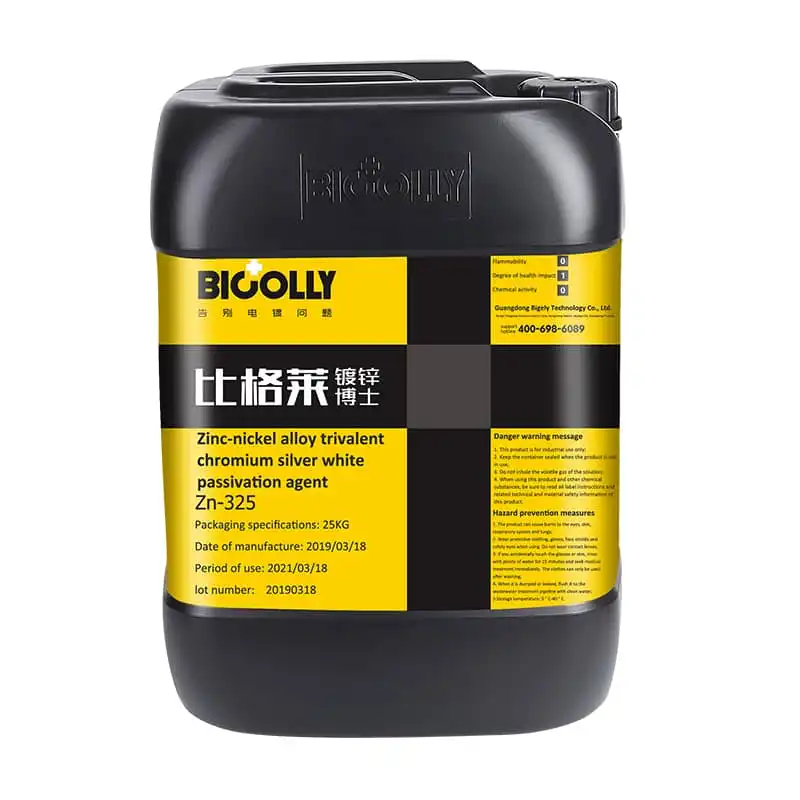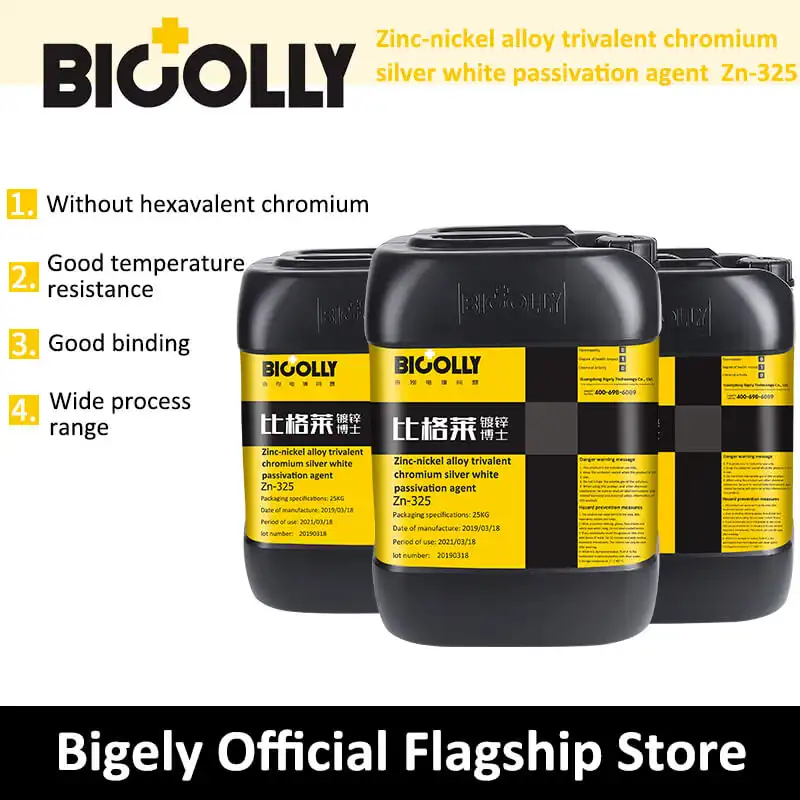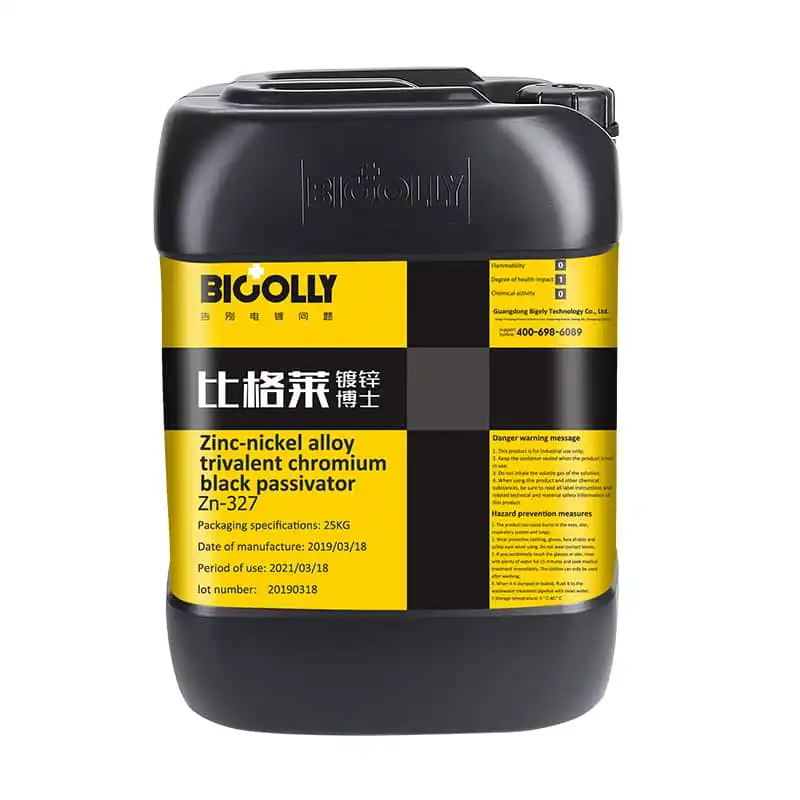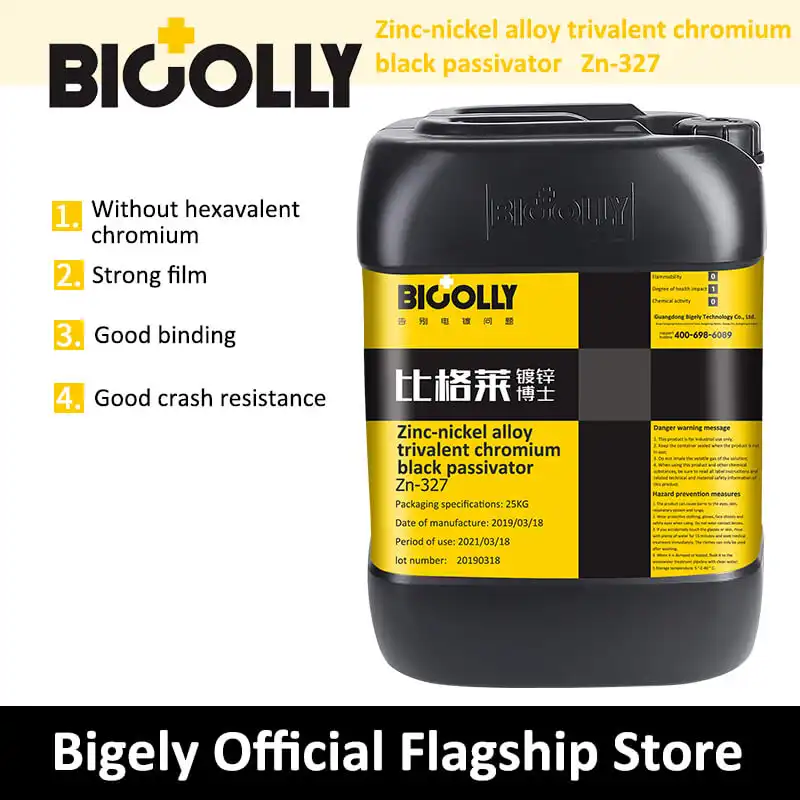Zinc-nickel alloy plating additives
51017 Alkaline zinc nickel alloy brightener
Description and characteristics
The environmentally friendly zinc-nickel alloy 51017 is an alkaline zinc-nickel alloy electroplating process, which is designed to meet the market demand for up to 16% nickel alloy content. This electroplated alloy can provide an improved corrosion resistance appearance and tolerance to post-passivation heat treatment. Can provide a complete series of coatings, including: color dull, white dull and black dull.
The environmentally friendly zinc-nickel alloy 51017 is particularly suitable for use in Bigley's trivalent chromium passivation series that meet the ELV guidelines.
Excellent anti-corrosion effect
Contains 12-16% nickel alloy deposit
Especially suitable for use in trivalent chromium passivation series
Suitable for rack plating and barrel plating
Good coating dispersion
Table of Contents
1. parameter
2. Build a bath
3. Tank fluid maintenance
4. Analysis control
5. equipment
6. safety warning
7. Wastewater treatment
8. Ordering Information
|
1. Parameters |
||
|
|
Rack plating |
barrel |
|
Zinc |
7.5-9.0g/l |
7.5-10.5g/l |
|
Sodium hydroxide |
110-120g/l |
110-130g/l |
|
Nickel metal |
0.85-1.3g/l |
0.85-1.3g/l |
|
Zinc-nickel alloy supplement ( 51021 ) |
2-3L/25Kgs NaOH |
2-3L/25Kgs NaOH |
|
Zinc-nickel alloy B agent ( 51018 ) |
4-8L/25Kgs NaOH |
4-8L/25Kgs NaOH |
|
Zinc-nickel alloy C agent ( 51019 ) |
7.5-10L/10kAh |
12.0-15L/10kAh |
|
Zinc-nickel alloy D agent ( 51020 ) |
1.5-2.5L/10kAh |
1.5-2.5L/10kAh |
|
Zinc-nickel alloy wetting agent ( 51022 ) |
0-1ml/L (0.1% volume ratio ) |
0-1ml/L ( 0.1% volume ratio) |
|
Cathode current |
1.5-2.5Adm -2 (15-25asf) |
0.3-1 Adm -2 (3-10asf) |
|
temperature |
20-28 ℃ ( 68-82 ℉ ) |
|
|
Stir |
Movement through the ejector system ( 1-2 circulations of solution per hour ) or cathode rods are recommended |
|
|
filter |
Recommended at 5-10 [mu] m then filtered filter paper (the solution is circulated per hour 2-3 times) |
|
Tank preparation
The tank must be clean. It is recommended to soak the tank with 1% sodium hydroxide solution overnight before use .
* Note: The exact amount of PartC will depend on the amount of nickel metal required in the working solution (see Part 1)
|
Chemicals needed |
Rack plating |
barrel |
|
Zinc |
7.5-9.0g/l |
7.5-10.5g/l |
|
Sodium hydroxide |
110-120g/l |
110-130g/l |
|
Zinc-nickel alloy supplement ( 51021 ) |
10ml/l (1% volume ratio ) |
10ml/l (1% volume ratio ) |
|
Zinc-nickel alloy A ( 51017 ) |
25ml/l (2.5% volume ratio ) |
25ml/l (2.5% volume ratio ) |
|
Zinc-nickel alloy B agent ( 51018 ) |
40ml/l (4% volume ratio ) |
40ml/l (4% volume ratio ) |
|
Zinc-nickel alloy C agent ( 51019 ) |
14-18ml/l (2.0% volume ratio ) |
15-18ml/l (2.0% volume ratio ) |
|
Zinc-nickel alloy D agent ( 51020 ) |
5-7ml/l (0.5-0.7% volume ratio ) |
3-5ml/l (0.3-0.5% volume ratio ) |
|
Zinc-nickel alloy wetting agent (51022) |
1ml/l (0.1% volume ratio ) |
1ml/l (0.1% volume ratio ) |
Bath steps
The steps to build 1000 liters of bath are as follows:
1. Add the calculated zinc concentrate and sodium hydroxide.
2. Add water so that the volume of the solution is not higher than 850L , and then add 10L of zinc-nickel alloy supplement
Refill. Before adding the solution, the temperature of the following zincate solution must be below 30 ℃ .
3. The composition of the separate solution is as follows:
|
|
Rack plating |
barrel |
|
Zinc-nickel alloy A ( 51017 ) |
25 L |
25 L |
|
Zinc-nickel alloy B agent ( 51018 ) |
40 L |
40 L |
|
Zinc-nickel alloy C agent ( 51019 ) |
15 L |
15 L |
|
Zinc-nickel alloy D agent ( 51020 ) |
5 L |
3 L |
|
water |
55 L |
57 L |
4. This mixture was added to the zinc solution and add 1ml / l of zinc-nickel alloy wetting agent (51022) to reduce the use of alkaline corrosion mist generated.
5. Before use, the current 0.5-2.0Adm -2 (5-20ASF) lower , electrolysis at least 24 hours.
|
Tank fluid maintenance |
Zinc-nickel alloy A ( 51017 )
Add A agent to increase the solubility of nickel in the solution. If this substance is too much, it will cause a decrease in cathode efficiency and reduce the nickel content in the alloy.
Zinc-nickel alloy B agent ( 51018 )
Adding agent B is to improve the solution performance in the low current area. Excessive addition of B will severely reduce cathode efficiency.
Zinc-nickel alloy C agent ( 51019 )
Agent C is a nickel metal additive. 1ml/l of C agent will increase the nickel concentration in the bath to 66ppm.
Zinc-nickel alloy D agent ( 51020 )
Agent D is the main bright component and can limit the deposition in the high current area.
|
Analysis control |
Analysis method of environmental protection zinc-nickel alloy
Zinc can be analyzed by AAS or the following methods
Method 1a-Use zinc and sodium hydroxide together
Reagent
0.1N EDTA
NH 2 SO 4
BDH 1113 indicator
EDTA indicator solution
PH 10 buffer solution
4% formaldehyde solution
Sodium cyanide
a.Draw 5ml of sample solution and dilute to 10ml with water .
b.Titration was performed with NH 2 SO 4 and MacDermid 1113* indicator was used to indicate the yellow endpoint.
c.The concentration of NaOH ( g/l ) = NH 2 SO 4 (mls) × 8
d.Add 20mls to this solution containing 10g/l NaCN , pH 10 buffer solution
e.Add a few drops of EDTA indicator solution
f.Add formaldehyde ( 4% solution) until the solution turns pink / orange
g.Titrate to the yellow endpoint with 0.1N EDTA .
h.The concentration of zinc ( g/l ) =EDTA(mls) × 1.3
Method 1b- Zinc
Reagent
0.1N EDTA
12.5% volume ratio HCL
Xylenol orange indicator Xylene Orange indicator
PH 5.5 buffer solution
a. Take 5ml of the sample solution and dilute it to 50ml with water .
b. Add 5ml 12.5% HCL
c. Add 20ml PH 5.5 buffer solution and XO indicator.
d. Titrated with 0.1N EDTA , the color of the solution changed from red to yellow / orange.
e. Concentration of zinc ( g/l ) = EDTA(mls) × 1.3
Method 1c- Sodium Hydroxide
Reagent
N HCL
Consumption indicator Indigo Indigo-carmine indicator
a. Take 5ml of the sample solution and dilute it to 50ml with water
b. Add edible indigo indicator
c. Titrated with N HCL , the color changed from orange to blue.
d. The concentration of sodium hydroxide = HCL ( mls ) × 8.0
2) Nickel - Nickel can be measured by AAS or the following analytical methods.
Method 2a
Reagent
12.5% volume ratio HCL
PH5.5 buffer solution
20% citric acid ammonia ammonia citrate
5% gum arabic gum arabic
0.5% 1 , 2 -cyclohexanedione dioxime Nioxime
a. Accurately draw 10mls of plating solution into a 100mls volumetric flask. Add water to bring the volume of the solution to the mark.
b. Pipet 2ml of this solution into a large beaker and add 2mls of 20% ammonium citrate solution.
c. Add 5ml 12.5%HCL to this solution , and add 20ml pH5.5 buffer solution. Make sure that the PH is between 4 and 6 .
d. Add 2ml solution of gum arabic, and then adding 2ml0.5% of 1 , 2- cyclohexanedione dioxime solution, and adding water to dilute to 100mls . Let stand for 15 minutes.
e. Using a photometer, measure the absorbance at 520nm.
f. Use the standard nickel curve to determine the gm of nickel .
The Hull cell test of the new solution will pass XRF and get the following results 1A-20m.
4asd 8-10 microns 14-16% nickel
2asd 5-6 microns 12-15% nickel
0.5asd 2-2.6 microns 12-13% nickel
|
Equipment |
Trough
Rubber lining steel, PVC or PP . It is recommended to use an independent zinc dissolving tank, so that the solution overflows from the plating tank into the dissolving tank to replenish the zinc content. If you need more details, please contact Bigley.
Stir
It is recommended to perform a slight solution exercise. Do not use air to stir.
filter
It is strongly recommended.
anode
It is recommended to use nickel anodes. It is recommended to use nickel bars or oval anodes. It is recommended not to use nickel flakes, small balls or round balls. The ratio of anode to cathode should be 1 : 1 .
heating
Heating is to ensure that the temperature is not lower than the required operating range. It is best to use iron, steam or hot water heating coils. Alternatively, iron-covered electric immersion heaters can be used.
cool down
This is needed. An iron ring that can be operated with chilled water should be used.
Warning: Do not connect the cooling coil directly to the main water supply device.
|
safety warning |
Please check the relevant material safety information.
|
Wastewater treatment |
It is recommended that the wastewater treatment carried out should meet the special requirements of the local government. Once you know how to meet these requirements, you can ask Bigley for information.
|
7. Ordering Information |
|
|
product |
Product number |
|
Zinc-nickel alloy A agent |
51017 |
|
Zinc-nickel alloy B agent |
51018 |
|
Zinc-nickel alloy C agent |
51019 |
|
Zinc-nickel alloy D agent |
51020 |
|
Zinc-nickel alloy supplement |
51021 |
|
Zinc-nickel alloy wetting agent |
51022 |
statement:
Any safety / health regulations given in this TDS are general recommendations. Anyone who uses it should obtain the relevant MSDS from the technical service personnel of Bigley . The MSDS has more detailed safety regulations.
All the contents specified in this TDS are for reference / guidance, and users must adjust them according to their actual operating conditions.
FAQ
1. Q: Do you make the products yourself? Are you a trader or a manufacturer?
A: Yes, the products are produced by our company. Our company is a manufacturer focusing on the R&D and manufacturing of environmental protection electroplating additives. Our factory has 5000 square meters with an annual capacity of 15000 tons.
2. Q: Can your company send samples for trial?
A: We can provide samples for trial.
3. Q: What is the quality of your products?
A: Our company all products core raw materials is used by Germany BASF, American Dow Chemical and other international brand products. The production process is strictly in accordance with the ISO9001 quality management system, from the incoming inspection, product inspection, according to the strict inspection standard, ensure that every drop of products qualified. Product quality you can rest assured, like BYD, Huawei, Foxconn such enterprises are also using our products.
4. Q: How long is the shelf life of your products?
A: The shelf life of our products is two years. If you do not use up the products within a short time after you buy them, we suggest you store them in a cool place, not in the sun or in a high temperature environment.
5. Q: Are your products environmentally safe?
A: Our products have passed the SGS test and are recognized as "Green and Environment-friendly Promotion Products". Many auto parts and electronic products which use our products can pass the strict environmental protection test when they are exported to Europe and America. Therefore, we can be trusted in terms of environmental protection and safety.
6. Q: Can your company provide technical services?
A: Yes, our company has a technical service team of more than 10 people. The technical engineers all have more than 20 years' experience in electroplating factory. They can provide customers with comprehensive technical of pre-sales and after sales.
7. Q: Is it possible to visit your company?
A: Yes, of course. You are very welcome! We can meet you at Jieyang airport, If you can come to our city. Also you can visit our factory through live video.
8. Q: Can you customize products according to our needs?
A: Yes, our company has research and development strength, the product formula derived from Europe and the United States laboratory, European and American engineers technical support, work together with domestic universities. Our company has a member of Guangdong province expert enterprise workstation, Shantou university science and technology correspondent workstation, Jieyang city environmental protection engineering research center for electroplating additive.Therefore, it can meet all kinds of customized requirements proposed by customers.
 Products
Products